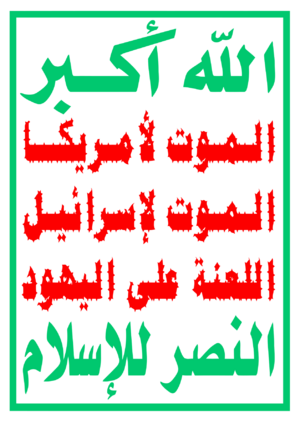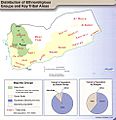Houthi movement facts for kids
Quick facts for kids Houthis |
|
|---|---|
| الحوثيون Participant in
|
|

The Sarkha
|
|
| Active | 1994–present |
| Ideology |
|
| Groups | Houthi tribe and Zaidi Shias |
| Leaders | Abdul-Malik al-Houthi (since 2004) Hussein al-Houthi † (1994–2004) † |
| Spokesman | Mohammed Abdul Salam |
| Headquarters | Saada, Yemen (since 1994) Sanaa, Yemen (since 2014) |
| Area of operations | Yemen, including Saudi Arabia–Yemen border |
| Allies | State allies:
|
| Opponents | State opponents:
|
| Designated as a terrorist organisation by | |
|
|
The Houthi movement (/ˈhuːθi/; Arabic: الحوثيون al-Ḥūthiyūn [al.ħuː.θi.juːn]), officially known as Ansar Allah (أنصار الله ʾAnṣār Allāh, lit. Supporters of God), is a Shia Islamist political and military organization that emerged from Yemen in the 1990s. It is predominantly made up of Zaidi Shias, with their namesake leadership being drawn largely from the Houthi tribe.
Under the leadership of Zaidi religious leader Hussein al-Houthi, the Houthis emerged as an opposition movement to Yemen President Ali Abdullah Saleh, whom they accused of corruption and being backed by Saudi Arabia and the United States. In 2003, influenced by the Lebanese Shia political and military organization Hezbollah, the Houthis adopted their official slogan against the United States, Israel, and the Jews. Al-Houthi resisted Saleh's order for his arrest, and was afterwards killed by the Yemeni military in Saada in 2004, sparking the Houthi insurgency. Since then, the movement has been mostly led by his brother Abdul-Malik al-Houthi.
The organization took part in the Yemeni Revolution of 2011 by participating in street protests and coordinating with other Yemeni opposition groups. They joined Yemen's National Dialogue Conference but later rejected the 2011 reconciliation deal. In late 2014, the Houthis repaired their relationship with Saleh, and with his help they took control of the capital city. The takeover prompted a Saudi-led military intervention to restore the internationally recognized government, leading to an ongoing civil war which included missile and drone attacks against Saudi Arabia and its ally United Arab Emirates. Following the outbreak of the 2023 Israel–Hamas war, the Houthis began to fire missiles at Israel and to attack ships off Yemen's coast in the Red Sea, which they say is in solidarity with the Palestinians and aiming to facilitate entry of humanitarian aid into the Gaza Strip.
The Houthi movement attracts followers in Yemen by portraying themselves as fighting for economic development and the end of the political marginalization of Zaidi Shias, as well as by promoting regional political–religious issues in its media. The Houthis have a complex relationship with Yemen's Sunnis; the movement has discriminated against Sunnis but has also allied with and recruited them. The Houthis aim to govern all of Yemen and support external movements against the United States, Israel, and Saudi Arabia. Because of the Houthis' ideological background, the conflict in Yemen is widely seen as a front of the Iran–Saudi Arabia proxy war.
Contents
Membership and ranks
There is a difference between the al-Houthi family and the Houthi movement. The movement was called by their opponents and foreign media "Houthis". The name came from the surname of the early leader of the movement, Hussein al-Houthi, who died in 2004.
Membership of the group had between 1,000 and 3,000 fighters as of 2005 and between 2,000 and 10,000 fighters as of 2009. In 2010, the Yemen Post claimed that they had over 100,000 fighters. According to Houthi expert Ahmed Al-Bahri, by 2010, the Houthis had a total of 100,000–120,000 followers, including both armed fighters and unarmed loyalists. As of 2015, the group is reported to have attracted new supporters from outside their traditional demographics.
Ideology
The Houthi movement follows a mixed ideology with religious, Yemeni nationalist, and big tent populist tenets, imitating Hezbollah. Outsiders have argued that their political views are often vague and contradictory and that many of their slogans do not accurately reflect their aims. The Houthis have portrayed themselves as national resistance, defending all Yemenis from outside aggression and influences, as champions against corruption, chaos, and extremism, and as representative for the interests of marginalized tribal groups and the Zayidi sect.
The group has also exploited the popular discontent over corruption and reduction of government subsidies.
Religion
In general, the Houthi movement has centered its belief system on the Zaydi branch of Islam, a sect of Islam almost exclusively present in Yemen. Zaydis make up about 25 percent of the population, Sunnis make up 75 percent. Zaydi-led governments ruled Yemen for 1,000 years up until 1962. Since its foundation, the Houthi movement has often acted as advocates for Zaydi revivalism in Yemen.
Women's rights and freedom of expression
The Houthis' treatment of women and their restrictions on the arts has been subject of debate. On one side, the movement has stated that it defends women's rights to vote and take public offices, and some feminists have fled from government-held areas into Houthi territories as the latter at least disempower more radical jihadists. The Houthis field their own women security force and have a Girl Scouts wing. However, it has been also been reported that Houthis harass women and restrict their freedoms of movement and expression.
In regards to culture, the Houthis try to spread their views through propaganda using mainstream media, social media, and poetry as well as the "Houthification" of the education system to "instil Huthi values and mobilise the youth to join the fight against the coalition forces". However, the Houthis have been inconsistent in regards how to deal with forms of artistic expression which they disapprove of. The movement has allowed radio stations to continue broadcast music and content which the Houthis view as too Western, but also banned certain songs and harassed artists such as wedding musicians. In general, the Houthis' policies are often decided on a local basis, and high-ranking Houthi officials are often incapable of checking regional officers' powers, making the treatment of civilians dependent on the area.
Leaders
- Hussein Badreddin al-Houthi – former leader (killed 2004)
- Abdul-Malik Badreddin al-Houthi – leader
- Yahia Badreddin al-Houthi – senior leader
- Abdul-Karim Badreddin al-Houthi – high-ranking commander
- Badr Eddin al-Houthi – spiritual leader (died 2010)
- Abdullah al-Ruzami – former military commander
- Abu Ali Abdullah al-Hakem al-Houthi – military commander
- Saleh Habra – political leader
- Fares Mana'a – Houthi-appointed governor of Sa'dah, and former head of Saleh's presidential committee
Activism and tactics
Political
During their campaigns against both the Saleh and Hadi governments, Houthis used civil disobedience. Following the Yemeni government's decision on 13 July 2014 to increase fuel prices, Houthi leaders succeeded in organising massive rallies in the capital Sanaa to protest the decision and to demand resignation of the incumbent government of Abd Rabbuh Mansur Hadi for "state-corruption". These protests developed into the 2014–2015 phase of the insurgency. Similarly, following 2015 Saudi-led airstrikes against Houthis which claimed civilians lives, Yemenis responded to the Abdul-Malik al-Houthi's call and took to streets of the capital, Sanaa, in tens of thousands to voice their anger at the Saudi invasion.
The movement's expressed goals include combating economic underdevelopment and political marginalization in Yemen while seeking greater autonomy for Houthi-majority regions of the country. One of its spokesperson Mohammed al-Houthi claimed in 2018 that he supports a democratic republic in Yemen. The Houthis have made fighting corruption the centerpiece of their political program.
Cultural
The Houthis have also held a number of mass gatherings since the revolution. On 24 January 2013, thousands gathered in Dahiyan, Sa'dah and Heziez, just outside Sanaa, to celebrate Mawlid al-Nabi, the birth of Mohammed. A similar event took place on 13 January 2014 at the main sports' stadium in Sanaa. On this occasion, men and women were completely segregated: men filled the open-air stadium and football field in the centre, guided by appointed Houthi safety officials wearing bright vests and matching hats; women poured into the adjacent indoor stadium, led inside by security women distinguishable only by their purple sashes and matching hats. The indoor stadium held at least five thousand women—ten times as many attendees as the 2013 gathering.
Images for kids
-
The September 2023 political and military control in the Yemeni Civil War (2014–present)
-
Yemen's former president Ali Abdullah Saleh was allied with Houthis from 2014 until his death in 2017.
See also
 In Spanish: Hutíes para niños
In Spanish: Hutíes para niños








